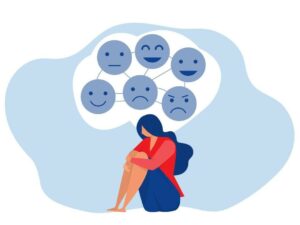Bipolar disorder is a challenging mental health condition that affects millions of individuals worldwide. Coping with the highs and lows of bipolar disorder can be a daunting task, and many individuals seek professional guidance to navigate their journey toward stability and fulfillment. In this article, we’ll explore the role of a bipolar life coach, how they can assist individuals in managing their condition, and how to find the right coach for your unique needs.
Contents
Understanding Bipolar Disorder

Bipolar disorder, formerly known as manic-depressive illness, is a complex mental health condition characterized by extreme mood swings that include periods of intense emotional highs (mania or hypomania) and lows (depression). These mood swings can be severe and disruptive to a person’s life. Here’s a more detailed understanding of bipolar disorder:
Types of Bipolar Disorder:
- Bipolar I Disorder: This is the most severe form of bipolar disorder. It involves manic episodes that last at least seven days or are so severe that hospitalization is required. Depressive episodes typically accompany manic episodes or occur separately.
- Bipolar II Disorder: Bipolar II is characterized by recurring depressive episodes and at least one hypomanic episode. Hypomania is less severe than full-blown mania and may not lead to significant life disruption.
- Cyclothymic Disorder: This is a milder form of bipolar disorder where a person experiences periods of hypomania and mild depression for at least two years.
Role of a Bipolar Life Coach
A bipolar life coach plays a crucial role in helping individuals with bipolar disorder manage their condition and lead fulfilling lives. Here are some key aspects of their role:
- Emotional Support: A bipolar life coach provides emotional support and understanding to individuals with bipolar disorder. Living with this condition can be emotionally challenging, and having a coach who can empathize with the unique struggles and triumphs can be immensely helpful.
- Education and Awareness: They educate clients about bipolar disorder, its symptoms, triggers, and treatment options. This knowledge helps clients better understand their condition and make informed decisions about their treatment and lifestyle.
- Goal Setting: Bipolar life coaches work with clients to set realistic and achievable goals. They help clients identify their strengths and weaknesses, and together, they develop strategies to work towards personal and professional objectives.
- Mood Management: Coaches assist clients in recognizing mood swings, both manic and depressive, and developing strategies to manage them. This might involve creating a daily routine, learning stress-reduction techniques, and recognizing early warning signs of mood shifts.
- Medication Compliance: Ensuring that clients adhere to their prescribed medications is essential. Coaches can help clients understand the importance of medication and provide strategies to remember and take them regularly.
- Crisis Management: In times of crisis, such as severe manic or depressive episodes, coaches can provide support and guidance on how to seek immediate help, such as contacting mental health professionals or crisis hotlines.
- Lifestyle and Self-Care: Coaches emphasize the importance of a healthy lifestyle, including regular exercise, a balanced diet, and adequate sleep. They encourage self-care practices that can help stabilize mood and improve overall well-being.
- Relationships and Communication: Bipolar life coaches work with clients to improve their interpersonal skills and communication with family and friends. They may help clients navigate challenges in their relationships caused by their condition.
Benefits of Working with a Coach
Working with a bipolar life coach can offer several benefits, including:
- Improved Mood Management: Coaches can provide strategies for managing mood swings and developing coping skills.
- Enhanced Self-Awareness: Clients gain a deeper understanding of their condition and triggers.
- Goal Achievement: Coaches help individuals set and achieve personal and professional goals.
- Accountability: Regular coaching sessions keep clients on track with their mental health and life objectives.
Qualities to Look for in a Bipolar Life Coach

When seeking a bipolar life coach, it’s important to find someone who possesses specific qualities and qualifications to effectively support individuals living with bipolar disorder. Here are some key qualities and criteria to look for in a bipolar life coach:
- Training and Certification: Ensure that the coach has relevant training and certifications in life coaching, mental health, or a related field. Look for credentials that demonstrate their expertise in working with individuals with bipolar disorder.
- Experience: Seek a coach with experience specifically in coaching individuals with bipolar disorder. Experience in mental health coaching or counseling is valuable.
- Empathy and Compassion: A good coach should be empathetic, understanding, and nonjudgmental. They should create a safe and supportive environment in which clients feel comfortable sharing their thoughts and feelings.
- Knowledge of Bipolar Disorder: The coach should have a strong understanding of bipolar disorder, its symptoms, treatment options, and challenges. This knowledge helps them provide informed guidance and support.
- Effective Communication Skills: Effective communication is crucial. The coach should be a good listener, able to ask probing questions, and skilled at helping clients express their thoughts and emotions.
- Goal-Oriented Approach: Look for a coach who can help clients set clear, achievable goals and develop action plans to work toward them. Goal setting and tracking progress are essential components of coaching.
- Flexibility: Bipolar disorder can be unpredictable, and the coach should be flexible in adapting their approach to meet the client’s changing needs. They should be willing to adjust strategies and goals as necessary.
The Coaching Process by Bipolar Life Coach
The coaching process by a bipolar life coach typically follows a structured and client-centered approach designed to help individuals with bipolar disorder achieve their goals, manage their condition effectively, and improve their overall well-being. Here is an overview of the coaching process:
Initial Assessment and Goal Setting:
- Establishing Trust: The coaching relationship begins with building trust and rapport. The coach creates a safe and nonjudgmental environment for the client to share their experiences and concerns related to bipolar disorder.
- Assessment: The coach conducts an initial assessment to understand the client’s unique challenges, strengths, and goals. This assessment may include discussions about the client’s medical history, current treatment plan, and personal aspirations.
- Goal Setting: Together, the client and coach identify specific, measurable, and realistic goals. These goals may be related to symptom management, personal development, relationships, or other areas of the client’s life.
Creating an Action Plan:
- Developing Strategies: The coach collaborates with the client to develop a customized action plan. This plan includes strategies, activities, and milestones to help the client progress toward their goals.
- Identifying Resources: The coach may assist the client in identifying resources, such as healthcare providers, support groups, or educational materials, to support their journey.
Combining Coaching with Medical Treatment
Combining coaching with medical treatment is a holistic approach to managing bipolar disorder and other mental health conditions. This integrated approach recognizes that both professional medical treatment and coaching can play essential roles in supporting individuals with bipolar disorder. Here’s how coaching can be effectively combined with medical treatment:
Collaboration with Healthcare Professionals:
- The bipolar life coach should work in collaboration with the individual’s healthcare team, which may include psychiatrists, therapists, and primary care physicians.
- Regular communication and information sharing between the coach and medical professionals are crucial to ensure a comprehensive and coordinated treatment plan.
Medication Adherence:
- The coach can help the individual understand the importance of medication in managing bipolar disorder and support them in adhering to their prescribed medication regimen.
- Encouraging open communication with healthcare providers about any medication side effects or concerns is a part of this process.
Symptom Monitoring and Early Intervention:
- The coach and the individual can work together to identify early warning signs of mood shifts (mania or depression) and develop a plan for addressing these signs promptly.
- Rapid intervention and adjustments to treatment plans, when necessary, can help prevent more severe mood episodes.
Finding the Right Bipolar Life Coach

Finding the right bipolar life coach is essential for receiving effective support and guidance in managing bipolar disorder. Here are steps to help you find the right coach:
Identify Your Needs:
- Clarify your specific needs and goals for coaching. What challenges are you facing related to bipolar disorder? What do you want to achieve with the help of a coach?
Research and Referrals:
- Ask for referrals from mental health professionals, support groups, or trusted friends and family who may have experience with bipolar coaching.
- Use online directories and search engines to find coaches who specialize in bipolar disorder.
Check Qualifications:
- Verify the coach’s qualifications, including their training, certifications, and experience in coaching individuals with bipolar disorder or related mental health conditions.
- Look for coaches who have completed accredited coaching programs and have relevant certifications.
Interview Potential Coaches:
- Arrange initial consultations or interviews with potential coaches. Many coaches offer free initial consultations to discuss your needs and their approach.
- Ask about their coaching style, experience, and their understanding of bipolar disorder.
Ask About Their Approach:
- Inquire about the coach’s approach to coaching individuals with bipolar disorder. Are they client-centered, goal-oriented, and collaborative?
- Discuss how they work with clients to set goals and create action plans.
Compatibility and Rapport:
- Pay attention to your gut feeling during the consultation. Do you feel comfortable and confident in the coach’s abilities to help you?
- Consider whether the coach’s personality and communication style align with your preferences.
References and Testimonials:
- Ask the coach for references or testimonials from previous clients who have worked with them. Contact these individuals to gather insights into their experiences.
Discuss Fees and Logistics:
- Clearly understand the coach’s fees, payment structure, and the duration and frequency of coaching sessions.
- Discuss logistical details, such as how sessions will be conducted (in-person, phone, video), and their cancellation policy.
Conclusion
Bipolar life coaching can be a valuable resource for individuals living with bipolar disorder. It provides guidance, support, and strategies to manage the condition effectively and improve overall well-being. By finding the right coach and committing to the coaching process, individuals can achieve stability and fulfillment in their lives.
If you looking for a supportive life coach MantraCoach is here to help. Book your free trial online life coaching session now to connect with a specialist life coach.


